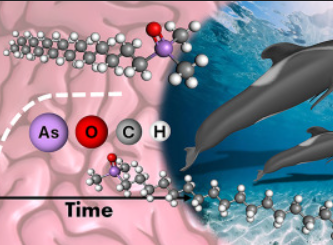Johannes, Lhiam and Nan have analysed the water-soluble and lipid-soluble arsenic compounds in pilot whales stranded in Scotland. No arsenobetaine in the brain, liver and kidneys but arsenolipids (arsenic containing hydrocarbons and phospholipids). This is worrying, since the hydrocarbons are neurotoxic. What does that mean for us humans?
Begin of page section:
Page settings:
End of this page section. Go to overview of page sections
Begin of page section:
Search:
Close
End of this page section. Go to overview of page sections
Search
Begin of page section:
Main navigation:
Page navigation:
- University
University
Developing solutions for the world of tomorrow - that is our mission. Our students and our researchers take on the great challenges of society and carry the knowledge out. - Research Profile
Research Profile
Scientific excellence and the courage to break new ground. Research at the University of Graz creates the foundations for making the future worth living. - Studies
Studies
- Community
Community
The University of Graz is a hub for international research and brings together scientists and business experts. Moreover, it fosters the exchange and cooperation in study and teaching. - Spotlight
End of this page section. Go to overview of page sections
Begin of page section:
You are here:
University of Graz analytische-chemie.uni-graz.at News Publication: Toxic arsenolipids bioaccumulate in the developing brain of pilot whales
End of this page section. Go to overview of page sections
Begin of page section:
Additional information:
End of this page section. Go to overview of page sections
End of this page section. Go to overview of page sections
